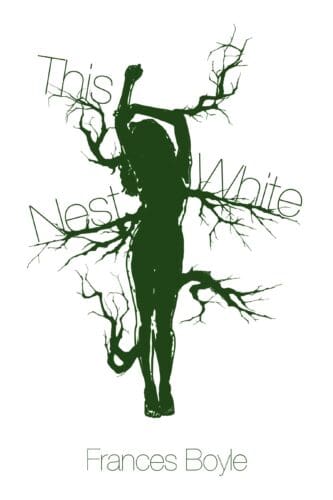Review: This White Nest by Frances Boyle
 Reviewed by Kim Fahner
Reviewed by Kim Fahner
This review was originally published by Prairie Fire, Jan 28, 2020.
In the title poem of her newest collection, This White Nest, Frances Boyle poses the question “What shines?” This is the question that sits with the reader as they make their way through the poems, but others soon weave their way in, too. In “Tutelage,” Boyle’s keen sense of quiet observation distills itself into a question, when she considers how trees sleep: “What can I learn from them of dreaming?” Boyle is living fully in the world, mindful of its natural rhythms, and always curious and watchful. Her poems are full of beautiful little details and vivid images that remind us to take the time to look more closely at the quiet things that might too often escape our attention.
In “And so at last I climb,” Boyle writes of a “silence full of sounds,” aware of how silences have a place in the world, too. In silences—she seems to suggest throughout all of these poems—we can find a true, clearer voice. That kind of epiphany, though, only really ever comes when a person is willing to journey into the deepest parts of themselves. In the poem “handle with care,” the poet writes of a “peach flesh girl” who is so “susceptible to breeze/or the merest shake/she bruises easily.” These journeys into self aren’t simple or easy, not by any means. They are soul rattling explorations that require a person to face their fears head on.
Divided into four sections, This White Nest has an earthy and ancient spirit about it, as if you might encounter a ‘divine feminine’ or ‘wise woman’ figure at its core, a woman who takes you by the hand and walks you through the book as a guide. In “Storm,” the speaker says “I sip the far-off lightning, green twig/bitterness in my mouth.” In “Augury,” an internal, italicized voice demands “Divine it now.” Later, the poet writes of how the act of storytelling is sacred and mysterious. “The seer in me will finger/the fabric again/read it,” the story itself about to “crack open the beginning/circling round/to where I, diviner choose to end.” There is magic in how poems arrive on a page or laptop screen, so the notion of something alchemical being involved is fitting.
What Frances Boyle does with This White Nest is ask us to sit quietly for a bit, to “contemplate/The life of quiet,” to notice its gifts in a more mindful and grateful way. This suggestion, given the frenzy of the world at present, is something important and notable. We are not, Boyle suggests, individuals without connections. We are, instead, individuals who are woven into an elemental web of creativity. Any sort of separation is just an illusion, whether it be between past and present, or between humans in relationships, or between people and natural landscapes. This is a book that sings, and then makes you want to go out for a walk in the woods.
This White Nest by Frances Boyle (Quattro Books, 2019) 88 p.p., $20
ISBN # 978-1-988254-69-2
Kim Fahner was the fourth poet laureate of the City of Greater Sudbury, and her latest book of poems is These Wings (Pedlar Press, 2019). Kim is a member of the League of Canadian Poets and the Writers’ Union of Canada. She may be reached via her website at www.kimfahner.com and blogs regularly at www.kimfahner.wordpress.com
